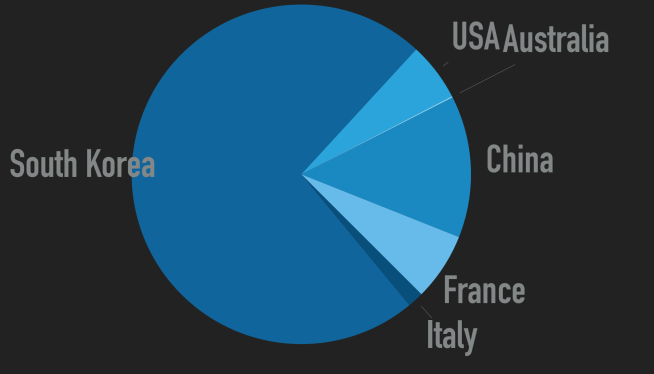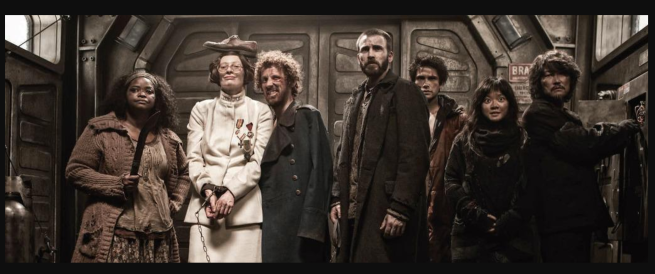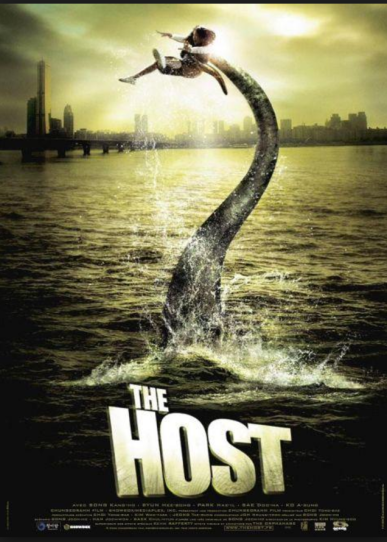Bong Joon Ho’s “Snowpiercer” is a post apocalyptic film set on a train with the left overs of humanity hurtling perpetually around an earth submerged in a second ice age. Snowpiercer, although being from a South Korean director is “often better understood as transnational rather than national or an international project” (Brian Yecies, Ae-Gyung Shim & Ben Goldsmith, 2011).

Lecture Slide Visually Depicting Box Office Share.
It is interesting to consider the film as transnational considering the many factors that went into creating Snowpiercer. Firstly the films inspiration comes from the French graphic novel Le Transperceneige. It has been adapated and filmed by a South Korean director, producers, crew. Using a Czech shooting location and crew. German Visual Effects and editing and UK, USA, SK cast. Finally the biggest box office returns for the films were in South Korea, China and France. It is interesting to note that despite the film being considered ‘transnational’ and having a range of Hollywood actors that the biggest box office returns come from South Korea and China.

A Visual Representation of how the film bonded nationalities and dissolved borders to achieve a common objective.
Another interesting factor to the creation of Snowpiercer is the Meta nature the film takes on through it’s production. The film is about a post apocalyptic world wherein borders are dissolved, nationalities faded, and people must work together towards a common goal. I think this is nicely paralleled by the production of the film. You have a range of nationalities working together towards a common goal, production and post production of the film crossed borders and went around the world through distribution. The director is certainly aware of this Meta element created throughout the films production.
“And so, as Snowpiercer continues its journey, the reality that all is only as influential as it is allowed to be is repeatedly made; once more, perception reigns supreme. Bong has created a work that overflows with symbolism and significance, while ambitiously questioning every element and explanation.” (Ward, 2014).
Look at the cast to begin: Chris Evans plays a forceful hero, and we know him as the epitome of the forceful hero through his role as Captain America. Ed Harris plays the figurehead of the train, a god figure, and this is nicely paralleled by his role as the God Hand in the Truman Show. Finally the films ending reinforces the environmental angle Snowpiercer takes and gives us a glimpse to a multicultural view of the future, not a white washed one. Snowpiercer’s heroes Song Kang-ho and Ko Ah-sung are from Bong’s second environmental horror: The Host.
In conclusion Snowpiercer is a fantastic film, which in studying really is a Meta study of film production, film story and distribution. I think Bong is aware of how Meta the film is just like his Meta approach to “The Host”. In many ways it’s a cautionary glimpse to a real future, and the practice of making the film brought people together in a similar way as humanity is brought together to achieve freedom in the film.

Bong’s second film: The Host, is well worth a watch if you enjoyed Snowpiercer.
References:
Yecies, 2011, “Digital Intermediary: Korean Transnational Cinema” 100-135pgs.
Ward, 2014, Metro Magazine; “Keep Your Eye on the Dystopian Ball, Jong Boon Ho’s Snowpiercer
Comments on other blogs:

Hi Finn,
Glad to hear your thoughts on Snowpiercer! You’ve made me aware of several interesting themes in the movie, such as the box office distribution of the movie or Director Bong’s Meta approach. It’s also interesting that you’ve linked the theme of this week with the “transnational cinema” theme from the beginning of the semester.
The majority of Snowpiercer are of Caucasian background with the exception of two Koreans. However, as you’ve pointed out, the box office share is biggest in South Korea. Do you think it is because of the leading character who are of Western background (Chris Evans who is so well-known for his role of Captain America?)? Or is it because South Korean audience wants to watch a movie directed by someone of their nationality?
Furthermore, you said “Snowpiercer takes and gives us a glimpse to a multicultural view of the future, not a white washed one”. How do you explain the dominating Caucasian in the cast if it is not whitewashing?
Look forward to read your thoughts!
Best,
Duong
LikeLike
Thanks Duong,
I like how you noticed the link from the end to the start of the course as was my intention to go full circle through my blog posts. I also loved how Snowpiercer can be discussed as meta exercise in the story of the film becoming close to the reality of production.
In answer to your main question; I think the popularity of Snowpiercer is down to distribution. I think advertising spend would’ve been larger in Korea, certainly more so than western countries. I think the reason for this is because it is a South Korean director collaborating with hollywood, the academy, and the wider world to create his own project. Something to be proud of and definitely something to be celebrated in Korea. I think Chris Evans has just as much chance of pulling crowds in western countries too so I don’t think his presence is contingent on the success of the film. My main theory is advertising spend would’ve been larger in the countries were it was a box office success.
To conclude I do think Snowpiercer gives a multicultural view of the world, whilst there are caucasian actors there are many other nationalities, and I think we must look deeper than the actors. The film has Korean subtitles for a majority of it. In this sense the film has been created across borders, written in varied language (french, to korean, to english), and viewed in multiple countries.
LikeLike
Hi Finn,
Great post on analyzing the transnationalism of the movie Snowpiercer! I particularly like the part where you pointed out the meta nature of it.
As you wrote in the post, if one look at Snowpiercer from the production perspective, it is definitely a transnational movie, produced by people from a variety of nationalities. However, if you take a look at the reception of it, the movie seems to be not so transnational after all. It could be said that it’s still a South Korean movie. How do you think we can define a transnational movie? What is it about Snowpiercer other than the production crew gives it a Korean-ness?
You also briefly mentioned the film’s ending. I wonder if you can expand on that and tell me more about what you think of the ending? What do you think it is suggesting(if anything at all)?
Thanks,
Jialu
LikeLike
Thanks Jialu,
I define transnational as something which operates or is created and enjoyed across borders, which in the case of Snowpiercer I think is definitely an apt definition.
The cast is a broad range of nationalities, from English, America, Korean, etc
Production company mixed between Korean, Polish
The concept is French
The box office whilst predominantly Korean is shared, and now the film is on Australian Netflix exposure has risen.
In terms of the films end; I think the Director Bong Ho is intentionally leading our thoughts more so to the environment rather than borders, or politics. In doing so he makes the film much more so about the environment and makes us an audience consciously think how we can think differently to work towards a greater goal – sustaining our planet.
LikeLike